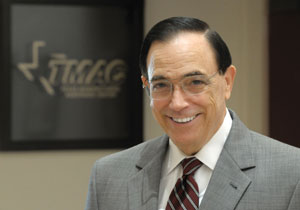FEATURE
STORIES
Geared up
With a stellar record of helping companies achieve superior efficiency, the Texas Manufacturing Assistance Center has become a vital cog in the state’s economic engine

o matter what the product, every company either prospers or declines based on how it accommodates a simple three-word mantra.
Better. Faster. Cheaper.
Trouble is, that sometimes sounds better than it plays out. Today’s relentless competition demands such a broad spectrum of skills that many manufacturers, particularly smaller companies, feel lost.
Solution? Call the Texas Manufacturing Assistance Center.
UT Arlington’s off-campus Automation and Robotics Research Institute has three extension centers, all designed to improve the competitiveness of the North Texas economy through the sharing and deployment of knowledge. The largest of these is the Texas Manufacturing Assistance Center, which consists of seven regional centers. The other two are the Small Business Development Center for Enterprise Excellence and the Cross Timbers Procurement Center.
TMAC is considered so critical to the success of manufacturing that it has become the single largest recipient of federal funds at the University. TMAC is affiliated with the Department of Commerce Manufacturing Extension Partnership (MEP) and has a working relationship with the Small Business Administration and a number of other state and federal agencies.
TMAC has served more than 4,200 Texas manufacturers, from mom-and-pop outfits with two or three employees to Fortune 500 companies. Its success stories (see 'Geared up: The TMAC Road to Success') are impressive and prolific.
“An interesting question we pose for our customers is this,” TMAC Director Drew Casani says. “What if you had a team of trained experts standing by to improve your bottom line?”
The answer, he said, is that there is such a team.
“This organization puts a wealth of tools and technology at the disposal of Texas manufacturers. TMAC is focused on understanding needs, having the right information, developing strategies, applying appropriate technologies, sensing new trends and delivering them all at the right time and on budget. We are able to provide credible solutions for manufacturing challenges with measurable improvements to the bottom line of Texas manufacturers.”
A little history: Concern about the competitiveness of U.S. manufacturing prompted Congress in 1988 to create the National Competitiveness Act. Originally designed to help implement technological research, the concept ran into problems right away.
“It was clear that many small manufacturers had issues that ranged from lack of skilled workforce to having enough revenue to make sustained changes,” Casani said. “Over time the focus was changed to provide a broader scope of assistance, including technology diffusion, quality systems and Lean Enterprise solutions.”
Fifty-nine Department of Commerce MEP centers were established around the country to provide that assistance. TMAC is the MEP for Texas.
“TMAC is not just a UT Arlington program,” he said. “It’s a state program.”
UT Arlington has general oversight of the seven programs in Texas, but it does so through partners in the other six regions—UT El Paso, the Texas Engineering Extension Service (part of the Texas A&M System), the University of Houston, UT Pan American, Texas Tech University and the Southwest Research Institute.
Casani emphasizes that there are no cookie-cutter solutions. But by the time a company works through the TMAC system, one thing is certain: It will have a better grasp of its strengths and weaknesses and a clearer view of what it must do to compete globally.
“We ask what is their vision, their strategy, their product, their market,” he said. “We look at making sure they can get the right product in the market, at the lowest cost. We emphasize the need to have the workforce aligned with the company vision and mission. There may have to be additional workforce training. Finally, we need to always look at an appropriate technology for the customer that is efficient, user friendly and cost effective.”

- TMAC Director Drew Casani
Although TMAC offers several training programs, the most popular may be the Lean Enterprise.
“Lean principles have their roots in the Toyota Production System of the 1950s and the Shingijutsu consulting company created by Toyota in the 1970s,” Casani explained. “TPS and its derivatives are marked by continuous learning and an unwavering focus on simplicity. Ultimately, the Lean way of thinking becomes pervasive throughout an entire company.”
He defines Lean as a systematic approach to eliminating waste. Designing processes to increase “flow” accelerates the velocity of materials moving through the manufacturing process. Operational improvements can then be leveraged to gain market share, increase profits, decrease costs, and increase customer and shareholder satisfaction.
The three key elements of Lean are structure, waste elimination and standardization, Casani said.
The Lean philosophy begins with understanding what the customer values and then tailoring everything to deliver and service what the customer wants. Companies that have this understanding tend to be efficient at creating things that are both wanted and necessary.
“It takes commitment and staying power, but the company that succeeds in making Lean thinking part of its corporate culture is well on the way to accomplishing that better-faster-cheaper model,” Casani said.
Such a company typically reports improvements in throughput and productivity, along with diminished inventories, reduced time-to-customers orders and reduced time to convert product ideas to actual products.
Lean is only one way that TMAC works with manufacturers to obtain superior efficiency and illustrates the overriding charge of TMAC and the other ARRI extension centers: to improve the competitiveness of the North Texas economy through sharing and deployment of knowledge.
Online:
www.tmacmetroplex.org
www.sbdcexcellence.org
www.arri.uta.edu/crosstimbers
See the related article 'Geared up: The TMAC Road to Success'.
— O.K. Carter
Other Stories
Deans named
for School of Urban and Public Affairs, Honors College
Study shows teen victims seek friends' help
United they stood
Supporters convinced legislators to trumpet the University’s research strengths
UT Arlington's new mace
Art meets Academia
Search
Contact Us
Office of University Publications
502 S. Cooper St.279 Fine Arts Building
Box 19647
Arlington, TX 76019-0647
